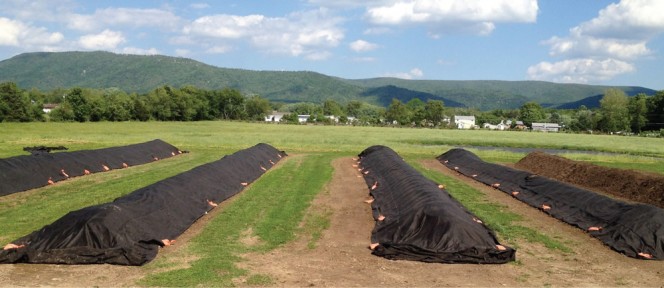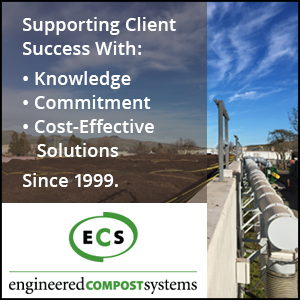Permitted to compost 2,800 tons/year of source separated organics, Black Bear Composting is expanding at a manageable pace.
Ryan Cooper
BioCycle October 2015
After 15 years of running a tech company in Chicago, Eric Walter and his family decided it was time to move back to his home state of Virginia six years ago. Always interested in recycling and composting, he started looking for a new venture, and decided to focus on building composting capacity in the Charlottesville and central Shenandoah Valley area of the state.

Black Bear accepts food scraps, yard trimmings, food-soiled paper and BPI-certified compostable plastic products. Active windrows are covered with ComposTex’s compost fleece.
Photo by Eric Walter
Step one was learning how to go about building this kind of business. He hired Craig Coker, principal of Coker Composting and Consulting, to teach him the ropes, and participated in a US Composting Council Compost Operations Training Course in upstate New York in 2011. With Coker’s guidance, designs for the facility and the permitting process began.
Walter settled on a 47-acre parcel in Crimora, in Augusta County, to site Black Bear Composting. Permitted by the Virginia Department of Environmental Quality in 2011 as a solid waste facility, Black Bear’s Type III permit allows it to accept pre and postconsumer food waste as well as animal manures. It is permitted to accept up to 2,800 tons/year, and currently processes 1,500 tons of food waste annually.
The composting site has two, 1-acre composting and curing pads, and a 3-acre pad for carbon storage, including yard trimmings, leaves and wood chips. An innovative storm water management system includes bioswales, two rain gardens, and four underground cisterns. If the cisterns fill up, Walter recycles the water by applying it to the windrows.
The only impervious surface on the site is a concrete waste reception pad surrounded by walls of movable concrete retaining wall blocks. This pad is cleared everyday of food waste. Carbonaceous material is used at the end of the day to soak up the water used to wash collection carts and provide a bed for incoming food waste.
When constructing the roads within his facility, Walter used Filtrexx’s SiltSoxx, filled with compost, instead of silt fences. “The Filtersoxx were our choice for meeting erosion control requirements during the construction of the facility,” he explains. “Augusta County approved them as a substitute for silt fencing. They were quite the hit.” When construction was completed, the socks were cut open and the contents were added to the compost windrows. “This was an opportunity to educate regulators, who were impressed by how much easier the Soxx were to install and remove as compared to traditional silt fencing,” Walter adds.
Sourcing Feedstocks, Collection
In addition to composting, Black Bear began a commercial and residential food scraps collection service. Commercial clients receive up to three collections/week. Black Bear offers two residential services: 65-gallon wheeled carts and 5-gallon sealed buckets. The price for the 5-gallon bucket service is a one-time $19 new member fee and $19/month. The 65-gallon wheeled cart service is a $23 one-time new member fee and $23/month. Customers are not required to sign a contract for a minimum collection term. Carts requiring cleaning are washed out at the composting facility. Food waste is accepted at the facility for $45/ton.
The day Black Bear Compost received its permit to accept food waste, Walter received a call from the University of Virginia seeking to divert organics to his facility. Other clients, including universities, businesses and school systems, have been added gradually. Martha Jefferson Hospital, in Charlottesville, is saving money by enrolling in the food waste collection program as it had been paying for waste removal based on the weight of the trash in a compactor. Food waste is so heavy that it significantly reduced the trash bill when the hospital began diverting food scraps from its compactor.
Black Bear accepts food-soiled paper and BPI-certified compostable plastic products. “We accept any certified compostable product,” notes Walter. “They breakdown just as effectively as cardboard. It’s all about exposure to the hottest part of the windrow versus spending time kicking around the outside of the pile. Stacks of compostable cups don’t break down until they start to come apart (destack). If the products end up in our overs pile after screening, we put them through the process again, just like cardboard that doesn’t breakdown the first time through. I’d say the biggest issue with compostable products isn’t their breaking down, it’s being able to tell them apart from their plastic counterparts.”

Commercial accounts use 65-gallon carts for food scraps, which Black Bear collects in a stake bed truck (above). Food scraps are unloaded on a concrete reception pad surrounded by walls of movable concrete blocks (right).
Photos by Ryan Cooper
Until recently, Black Bear used a stake bed truck with a lift gate to collect 21 carts at a time from customers in all of their service areas. Black Bear still handles collection in Harrisonburg (home of James Madison University) and other parts of the Shenandoah Valley. However, it recently partnered with Natural Organic Process Enterprise (N.O.P.E.), based in Richmond, Virginia, to service clients east of the Blue Ridge Parkway. Having enough clients was a prerequisite to the business decision to join forces with N.O.P.E. “Our stake bed truck was chosen as a cheap way to get going and can navigate smaller spaces such as alleys,” Walter says. But with drivers making two to three runs to Charlottesville per day (about 35 miles each way), Walter was faced with the decision between a purchasing a larger truck or seeking other hauling options, such as working with N.O.P.E.
Composting Operations
Black Bear composts in windrows turned with a tractor-pulled Sittler unit. The piles are relatively low because of the size of the turner. After turning, the facility covers its windrows with CV Compost’s ComposTex “compost fleece.” covers. One row’s cover costs roughly $1,200 and has to be replaced every four months because the crows rip them apart, according to Walter. Black Bear uses the covers to combat odor and to have tighter control over the process.
Material stays in active composting windrows for roughly 45 days, after which each batch undergoes a maturity test. Compost tests include a paddle test for ammonia and CO2 and a test for pathogens. “We turn each active windrow at least six times during those 45 days,” he says. “During the four months of curing, we turn a lot less frequently, maybe four times.” For curing, six or seven rows are combined. Black Bear compost is certified under the USCC’s Seal of Testing Assurance.
In another collaboration, Black Bear teams up with the largest source separated organics composting facility in Virginia, Royal Oak Farm, LLC, in Evington, to screen its compost. Two times a year, Royal Oaks brings its Volvo L70E loader and Doppstadt SM-720 screener. Walter also sends industrial food waste processors with large quantities of organics to Royal Oaks.
In the near future, Walter expects to reach his permitted capacity of 2,800 tons/year. To go beyond that capacity, Black Bear Composting needs to submit a proposal to Virginia DEQ. The DEQ requires that composting sites processing more than 4,000 tons/year must have a paved active composting site. To minimize costs, Walter is considering aerated static piles (ASP)in bays. “The idea is to minimize the concrete footprint,” he explains, adding that he has not submitted a proposal yet. The ASP bays would be built out of the same type of movable concrete retaining wall blocks as the waste reception pad.
One of the biggest challenges the facility faces is competition for wood chips with Dominion Energy Solutions’ biomass power stations. Black Bear accepts wood chips from local arborists for free, and charges $5/pick-up truckload of yard trimmings, and $15 for larger loads, which Walter chips once a year. He also accepts leaves from the City of Waynesboro in the fall. Other landscapers also bring leaves at that time of year. Finished compost is sold wholesale for $25/cubic yard.
Feedback To Generators
Black Bear provides collection customers data about the volume and weight of their diverted organics in a semiannual report. He turns year-to-date information into fun facts such as how many trash trucks the material would fill or how many inches deep it would be if it were spread onto a tennis court. He also translates avoided greenhouse gas emissions into trees planted, or number of taken cars off the road, etc. Black Bear provides window decals, social media mentions, and other opportunities for participating locations to advertise the fact that they separate their food waste for composting. Walter rewards food waste generators with finished compost. If they don’t want it, he donates the compost to faith-based and school gardens through the City Schoolyard Garden project and City of Promise in Charlottesville.
Generator concerns about odors related to food waste diversion have been addressed by frequent collection, compostable cart liners, and cart cleanliness. Black Bear sells 13-, 23-, 39-, and 65-gallon compostable liners to customers with a 10 percent markup. As for the argument that source separation takes more work on the part of the generators, Walter’s answer is that they are already doing the work. He tells customers that putting food waste in a different color bin is “in the wrist.”
Black Bear has been collaborating with a pilot-scale residential food waste program in Charlottesville, organized in the spring of 2015 by GreenBlue (a sustainability consulting firm) with funding from U.S. EPA. Participants bring food scraps to the Charlottesville City Market farmers market every Saturday morning, and they are taken to Black Bear for composting. More than two tons have been diverted (the pilot ran from April through September). Advertised through utility bills and other avenues, GreenBlue is collecting data about how many people bring their kitchen scraps to the market, how much is brought, and the level of local interest in composting. This data will help the City decide if, how, and when to offer residential food scraps collection service to its citizens.
Ryan Cooper recently joined Rubicon as Waste Diversion Specialist-Organics.














